仁爱英语九年级UT知识点讲解及练习
仁爱英语九年级unit-1-topic1-知识点总结

仁爱英语九年级unit-1-topic1-知识点总结Unit 1 The Changing WorldTopic 1 China has developed rapidly in recent years.一、重点词汇(一)词形转换1. training --动词: train“训练”2. whole --同音词: hole3. tidy--近义词: clean4. develop --名词: development、形容词: developed发达的、developing发展中的5. rapid --副词: rapidly6. old --比较;older; elder7. recent --副词: recently8. narrow --反义词): wide 9. title --近义词: subject(二)重点短语1.have a good summer holiday过一个愉快的暑假e back from…从……回来3.work for …为……工作4.feel sorry for…对……深表同情5. a disabled children’s home一家残疾儿童养育院6.the whole holiday 整个假期7.learn…from 从……当中学习8.feed a child 喂小孩9.write an article about…写一篇有关……的文章10.have a hard/ happy life过着艰苦的/ 幸福的生活11.in the past/ future 在过去/ 在将来12.in detail 详细地13.have no time to do sth.没有时间做某事14.afford ( to do) sth担负得起(做)某事15.give support to sb.给某人帮助/支持16.get a good education 获得良好的教育17.search…for…为了……搜索……18.with the development of…随着……的发展19.study/ go abroad 在国外学习/ 出国20.enter/ win/ lose a competition参加/ 赢得/ 输掉比赛ed to do sth. 过去常做某事22.feel satisfied with…对……感到满足23.see …. oneself 亲眼看见……24.make progress 取得进步25.thanks to 多亏; 幸亏;由于26.stand for代表27.with the help of…在……的帮助下=with one’s help28.draw up an outline 拟定提纲二、重点知识点1.Though I had no time to travel, I still felt very happy this holiday!尽管我没时间去旅游,但这个假期我仍然感到很愉快。
仁爱英语九年级UnitTopic练习题及答案解析
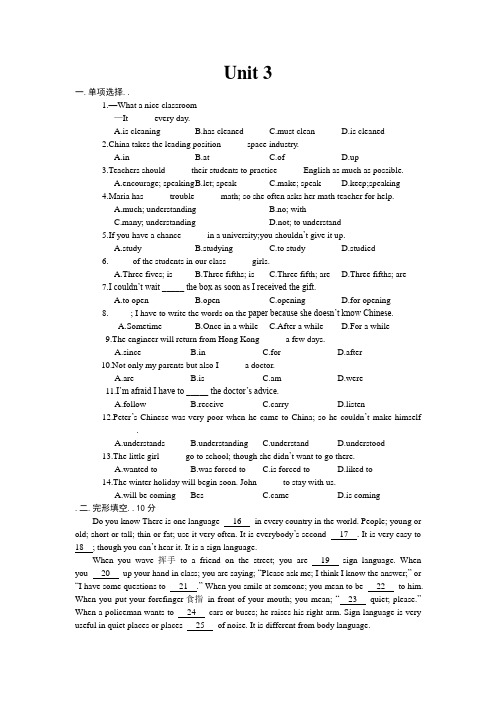
Unit 3一.单项选择..1.—What a nice classroom—It _____ every day.A.is cleaningB.has cleanedC.must cleanD.is cleaned2.China takes the leading position _____ space industry.A.inB.atC.ofD.up3.Teachers should _____ their students to practice _____ English as much as possible.A.encourage; speakingB.let; speakC.make; speakD.keep;speaking4.Maria has _____ trouble _____ math; so she often asks her math teacher for help.A.much; understandingB.no; withC.many; understandingD.not; to understand5.If you have a chance _____ in a university;you shouldn’t give it up.A.studyB.studyingC.to studyD.studied6._____ of the students in our class _____ girls.A.Three fives; isB.Three fifths; isC.Three fifth; areD.Three fifths; are7.I couldn’t wait _____ the box as soon as I received the gift.A.to openB.openC.openingD.for opening8._____; I have to write the words on the paper because she doesn’t know Chinese.A.SometimeB.Once in a whileC.After a whileD.For a while9.The engineer will return from Hong Kong _____ a few days.A.sinceB.inC.forD.after10.Not only my parents but also I _____ a doctor.A.areB.isC.amD.were11.I’m afraid I have to _____ the doctor’s advice.A.followB.receiveC.carryD.listen12.Peter’s Chinese was very poor when he came to China; so he couldn’t make himself_____.A.understandsB.understandingC.understandD.understood13.The little girl _____ go to school; though she didn’t want to go there.A.wanted toB.was forced toC.is forced toD.liked to14.The winter holiday will begin soon. John _____ to stay with us.A.will be coming Bes C.came D.is coming.二.完形填空..10分Do you know There is one language 16 in every country in the world. People; young or old; short or tall; thin or fat; use it very often. It is everybody’s second 17 . It is very easy to 18 ; though you can’t hear it. It is a sign language.When you wave挥手to a friend on the street; you are 19 sign language. When you 20 up your hand in class; you are saying; “Please ask me; I think I know the answer;” or “I have some questions to 21 .” When you smile at someone; you mean to be 22 to him. When you put your forefinger食指in front of your mouth; you mean; “23 quiet; please.”When a policeman wants to 24 cars or buses; he raises his right arm. Sign language is very useful in quiet places or places 25 of noise. It is different from body language.eingesB.actionnguageD.expressionB.sayC.expressD.understandingC.speakD.speakingB.makeC.putD.takeB.sayC.answerD.tellB.friendlyC.kindnessD.kindlyB.MakeC.IsD.BeB.catchC.stopD.preventB.noneC.madeD.someⅣ.阅读理解..30分AEvery person uses his own special words to show his ideas and feelings. Some of these expressions are commonly used for many years. Others are popular for just a short time. One such American expression is “Where’s the beef”. It is used when something is not as good as it is said to be. In the early 1980s; “Where’s the beef” was one of the most popular expressions in the United States. It seemed as if everyone was using it at that time.Beef; of course; is the meat from a cow; and no food is more popular in America than a hamburger made from beef. In the 1960s; a businessman named Ray Kroch began building small restaurants that sold hamburgers at a low price. Kroch called his restaurant “McDonald’s”. Ray Kroch became one of the richest businessmen in America.Other business people saw his success. Some of them opened their own hamburger restaurants. One company called “Wendy’s” said its hamburgers were bigger than those sold by McDonald’s or anyone else. The Wendy’s company began to use the expression “Wher e’s the beef ” to make people know that Wendy’s hamburgers were the biggest. The Wendy’s television advertisement showed three old women eating hamburgers. The bread that covered the meat was very big; but inside there was only a bit of meat. One of the women said she would not eat a hamburger with such a little piece of beef.“Where’s the beef”she shouted in a funny way. The advertisement for Wendy’s hamburger restaurants was a success. As we said; it seemed everyone began using the expression “Where’s the beef ”.根据短文内容;判断正T误F..26.The expression “Where’s the beef” is used when something is not as good as it is said tobe.27.Wendy started McDonald’s restaurant.28.Other people wanted to open hamburger restaurants because they thought they could makea lot of money.29.Wendy’s made the expression known to everybody by a television advertisement.30.The Wendy’s company wanted to tell others their hamburgers were the most delicious.BWhen I was 16 years old; I made my first visit to the United States. It wasn’t the first time I had been abroad. Like most English children; I learnt French at school and I had often been to France; so I was used to speaking a foreign language to people wh o didn’t understand English. But when I went to America I was really looking forward to having a nice easy holiday without any language problems.How wrong I was The misunderstanding began at the airport. I was looking for a public telephone to give my American friend Danny a ring and tell her that I had arrived. A friendly old man saw me looking like being lost and asked if he could help me.“Yes;”I said.“I want to give my friend a ring.”“Well; that’s nice;”he exclaimed 惊呼.“Are you getting married But aren’t you a bit young ”“Who is talking about marriage” I replied. “I just want to give my friend a ring to tell her I’ve arrived. Can you tell me where there’s a phone box”“Oh”he said.“There’s a phone downstairs.”When at last we did meet up; Danny explained the misunderstanding to me.“Don’t worry;”she said to me.“I had many difficulties at first. There are lots of words which the Americans use differently in meaning from us British. You’ll soon get used to all the funny things they say. But most of the time British and American people can understand each other”31.Which sentence is right according to the passageA.This was the first time for the writer to go abroad.B.The writer could speak French and English.C.He thought he would have some difficulties in understanding the Americans.D.The writer had been to the many times.32.When the writer arrived at the airport; he wanted to _____.A.buy a ring for his friendB.ask the way to his friend’sC.telephone his friendD.call a taxi33.The old man thought _____.A.the writer wanted to find a phone boxB.the writer was old enough to get marriedC.the writer didn’t know the wayD.the writer wanted to find his girlfriend34.At last; the old man _____.A.understood what the writer wanted to doB.couldn’t understand the writerC.bought a ring for the writerD.took the writer to the phone box by himself35.Which sentence is wrong according to the passageA.The writer’s friend; Danny had a lot of difficulties in the at first.B.There are some differences between American and British English.C.British people can’t understand the Americans most of the time.D.British and American people can understand each other most of the time.CEnglish is spoken as the first language by most people in the ; Britain; Australia; New Zealand; Ireland and Canada. However; English is spoken all over the world. It is the main language in over 60 countries; including India; Singapore and many of the Caribbean and Pacific islands. In these places English is often the second language.English is also an international language in many other countries; like China and Japan. People in these countries use it for business; and travelers to these countries use English when they want to communicate. Other people may learn English because they enjoy reading books inEnglish; listening to British or American music or watching American films.English has changed a lot over the years and still goes on changing. It is no longer right to talk about British English or American English if the speakers come or don’t come from those countries. People in Japan and Korea; for example; may use the American spelling but may not sound like American.English will probably be the most widely used language in the world by the end of the 21st century. This language no longer belongs to British; American or Australian speakers. It belongs to anyone in the world. So; as a middle school student today; think about how you can use this language. After you leave school; you will almost certainly need it.根据短文内容填空;每空一词..36.In the ; Britain and Australia; English is _____ as their _____ language.37.English is spoken as an _____ _____ by the people all over the world now.38.English doesn’t stay _____ _____; it has changed a lot over the years.39._____ the most widely used language will be _____ by the end of the 21st century.40.In the future; English will be more _____ and _____.One day; I happened to meet an Englishman in the street and soon we began to talk. As I was talking about how I was studying English; the foreigner seemed to be very surprised; gently shaking his head and saying;“You don’t say You don’t say” I was puzzled困惑的; and I thought; “Perhaps this is not a right thing to talk about.” So I said to him; “Well; shall we talk about the Great Wall Have you ever been there”“Certainly. When I’m back home; everyone will laugh at me if I leave here without seeing it. The Great Wall is wonderful”“Yes; it is one of the wonders in the world. And people of many countries have come to visit it.”As I went on telling him more about it; he stopped me again; “You don’t say”I couldn’t help asking;“Why do you ask me not to talk about it”“Well; I didn’t ask you to do so.” he answered; greatly surprised.“Didn’t you say ‘You don’t say’” I asked again.Hearing this; the foreigner laughed loudly. He began to explain;“‘You don’t say’means ‘Really’ Perhaps you know little about English idioms习惯用语.”Wow How foolish I was Since then I have been careful with English idioms.根据短文内容;判断正T误F..41.The foreigner didn’t want to listen to the writer to talk about how he was studying English.42.The writer was puzzled because the foreigner knew the Great Wall very well.43.The foreigner thought the Great Wall was wonderful.44.Perhaps the story happened in China.45.When the foreigner used the idiom“You don’t say”; he meant“Stop talking”参考答案及解析Unit 3 Topic 2第一部分听力Ⅰ.1.D 2.B 3.E 4.A 5.CⅡ.6.C 7.A 8.C 9.A 10.CⅢ.11.B 12.C 13.B 14.C 15.BⅣ.16.happened 17.pronunciation 18.spelling 19.meanings 20.differences第二部分基础知识运用Ⅰ. 1.C 此题考查对书本知识的熟悉程度..澳式英语中的Good on ya; mate与英式英语中的Well done同义..2.B since+点时间;in+段时间;常和将来时态连用;表示“以现在为起点;一段时间之后”;after+点时间;常和过去时态连用;for+段时间;指一段时间;而不指一段时间后..a fewdays为段时间;故正确答案为B..3.C 此题考查短语come about;意为“发生”.e to后接动词原形;come on有“加油”的意思;come in意为“进来”;故选C..4.C 此题考查主谓一致..not only … but also … 不但……而且……;谓语动词和but also之后的主语应该相一致..本题是在陈述一个事实;所以应该用一般现在时;故选C..5.C 此题考查短语depend on;意为“依靠”..6.A 本句中follow the doctor’s advice表示“遵照医嘱”..7.D 本句考查“make+宾语+过去分词”这一结构..过去分词作宾语补足语;表明宾语和宾补之间的关系是被动的..8.B 本题考查被动语态be forced to do sth. 表示“被迫做某事”;其从句是过去时态;故选择B项..9.D 本题考查be going to;表将来..10.B 根据题意“我不确定我是否去参加Tom的生日晚会..我可能去听音乐会吧”只有B项符合题意..Ⅱ. 11.E 12.B 13.G 14.D 15.FⅢ. 16.A 根据题意“世界上有一种被每个国家都使用的语言..”可知;此处是用过去分词used来作language的定语;表示被动含义..17.C 根据题意此处填language“语言”;符合上下文..18.D 根据下文though you can’t hear it. It is a sign language. 可知此处填understand更恰当..19.B 根据本句When you wave to a friend on the street; you are … 的题意和语法提示此处应填进行时态using..20.C 此题考查固定短语;put up举手;take up占据;make up组成;根据题意“当你在课堂上举手时”;你就是在表示“请……”; 可知举手符合题意..故选C..21.A 根据题意可知“我有问题要问”;此处为不定式作定语的结构..不定式作定语要后置;故选A..22.B be friendly to sb. 为固定结构;表示“对某人友好”..23.D 此处考查系表结构..be quiet在此处为祈使句形式;表示“安静”..24.C 根据题意当“警察想要拦住汽车或公共汽车时;他就举起右臂”;stop使停止;使静下来;而prevent表示“阻止;预防”;stop更符合题意..25.A full of充满; none of一个也没有; made of由……制成; some of ………当中一些..由题意“手势语在安静的地方或是嘈杂的地方是很有用处的..”可知选A..Ⅳ.A26.T 在文章第一段可直接找到该问题的答案..27.F 是Ray Kroch创办的麦当劳;而不是Wendy..28.T 从第三段开始可知;其他的商人看到了Kroch赚了很多钱;他们也都纷纷效仿..29.T 从第三段中间部分可知;Wendy’s公司是以在电视中播放的广告而出名的..30.F 从第三段最后可知;Wendy’s公司想让人们知道他们的汉堡是最大的而不是最美味的..B31.B 从阅读第一段得知;这并不是作者第一次出国;故排除A项答案..他认为在美国语言上不会遇到麻烦;故排除C..这是作者第一次去美国;故排除D..他在学校学过法语;所以可推断他可以讲法语和英语..故答案为B..32.C 当作者到达机场时;他想打电话通知他的朋友..而A项为给他的朋友买戒指;B项为问去朋友家的路;D项为打出租车..33.C 从阅读文章可知老人认为作者迷路了..而A项意为作者想要找电话亭;B项意为作者已到了结婚的年龄;D项意为作者想找他的女朋友..34.A 从老人告诉作者电话亭在楼下可推断老人听懂了作者的话..而B项意为他听不懂作者的话;C项意为他为作者买了一枚戒指;D项意为他亲自带作者到电话亭..35.C 从文章结尾部分可知作者的朋友最初在美国也遇到了许多困难;故A项排除..英式英语和美式英语之间存在着不同之处;故排除B..虽然英式和美式英语之间有所不同;但两国人在交流时没有太大的困难;大部分时候彼此能够理解对方的意思;故排除D项..C文章大意: 英语在美国、英国等国家是第一语言;即母语..随着社会的发展;越来越多的国家把英语作为第二语言..如今英语作为一种国际语言在不断地发展..在将来;它将会更有用、更重要..36.spoken; first 从文章第一句得知英语在美国、英国、澳大利亚等是第一语言..37.international language 从第二段得知英语在全世界已成为一种国际性的语言..38.the same 从第三段可知英语一直在改变..39.Perhaps/Maybe; English 从最后一段English will probably be the most widely usedlanguage in the world by the end of the 21st century. 一句中可得此答案..eful; important 从阅读全文可知;英语将会越来越有用;越来越重要..第三部分写作Ⅰ.A1.pronunciation 2.differences 3.autumn 4.victory 5.accentB6.forced/forces 7.Germans 8.differently 9.pronounced 10.AustraliaⅡ. 11.told/asked; to 12.the same as 13.to see; off14.saw; playing 15.difficulty/trouble; learningⅢ.参考范文:Dear Mr. Zhou;How are you I have been in Australia for a week. I come here to visit my uncle and spend the summer holiday. Just as I thought; I have some difficulties in understanding the people here. They speak too quickly. Sometimes I can’t follow them. And their accents are not the same. Even worse;I can’t understand some of the words they said. I really want to know how the differences come about. Please write to me soon.Best wishes to you and your family.Yours;Wang Qun。
仁爱英语新九年级上册unittopic知识总结和同步练习测试附参考答案图文稿

仁爱英语新九年级上册u n i t t o p i c知识总结和同步练习测试附参考答案文件管理序列号:[K8UY-K9IO69-O6M243-OL889-F88688]Unit2SavingtheearthTopic1Ican’tstandtheenvironmenthere.1.看到蜂蝶飞舞seebeesandbutterfliesdancing(seesb.doingsth.)2.去野餐haveapicnic/goforapicnic3.城市面貌thelookofourcities4.把废水倒入溪流中pourwasteintothestream5.有用的事物somethinguseful6.忍受/改善/保护环境stand/improve/protecttheenvironment7.产生难闻的气味produceterriblegas8.情绪好/差inagood/badmood9.设法做某事managetodosth.10.感到不舒适feeluncomfortable11.对某人/某物有害beharmfultosb./sth.(doharmtosb./sth.)12.目前,现在atpresent13.写信给某人writetosb.14.发出太多的噪音maketoomuchnoise15.打扰别人disturbothers16.一种污染akindofpollution17.对做了某事感到抱歉besorryfordoingsth.18.各种各样的allsortsof/allkindsof19.在吵杂的条件下innoisyconditions20.变聋了go/becomedeaf21.听力丧失havehearingloss22.相当多quiteafew23.(几乎)与……一样差nobetterthan24.引发高血压causehighbloodpressure25.在强烈、易变的光线下instrong,changeablelight26.在许多方面inmanyways27.随着人口的增长withtheincreaseinpopulation28.随着工业的发展withthedevelopmentofindustry29.对我来说很难呼吸Itisdifficultformetobreathe.30.你处于这样的状态多久了?Howlonghaveyoubeenlikethis?自从上个月以来我一直这样。
仁爱版英语九年级重点考点及配套练习(Units1-6)附答案
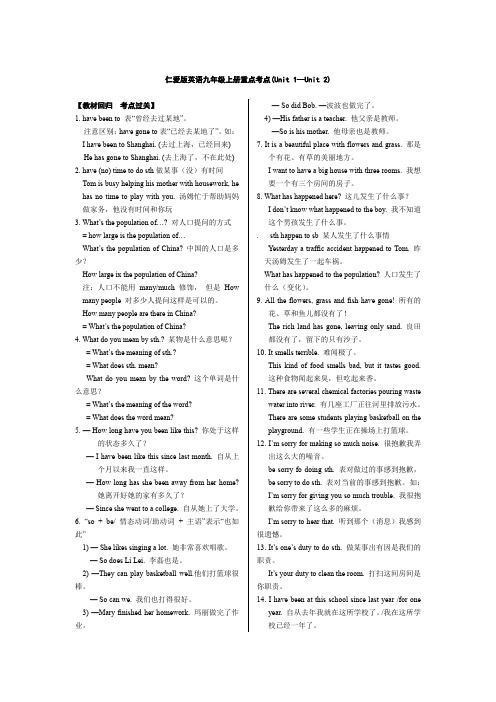
仁爱版英语九年级上册重点考点(Unit 1—Unit 2)【教材回归考点过关】1. have been to 表“曾经去过某地”。
注意区别:have gone to表“已经去某地了”。
如:I have been to Shanghai. (去过上海,已经回来)He has gone to Shanghai. (去上海了,不在此处) 2. have (no) time to do sth做某事(没)有时间Tom is busy helping his mother with housework, he has no time to play with you. 汤姆忙于帮助妈妈做家务,他没有时间和你玩3. What’s the population of…? 对人口提问的方式= how large is the population of…What’s the population of China? 中国的人口是多少?How large ix the population of China?注:人口不能用many/much 修饰,但是How many people 对多少人提问这样是可以的。
How many people are there in China?= What’s the population of China?4. What do you mean by sth.? 某物是什么意思呢?= What’s the meaning of sth.?= What does sth. mean?What do you mean by the word? 这个单词是什么意思?= What’s the meaning of the word?= What does the word mean?5. — How long have you been like this? 你处于这样的状态多久了?— I have been like this since last month. 自从上个月以来我一直这样。
仁爱英语九年级UT知识点

九年级unit 1考点解析Topic 1一、词组Section Atake photos 照相take place 发生by the way 顺便说一下be happy to do sth. 高兴做某事come back from…从…返回more and more 越来越…(可接名词或多音节形容词)so…that…/such…that…/so that… 如此…以至于…/因此improve your English 提高英语水平Section Btake part in 参加l earn…from… 向…学习have no time to do sth. 没时间做某事in the past 在过去have a hard life 过着艰苦的生活in detail 详细地day and night 日日夜夜give support to为某人提供帮助get/receive an education得到教育with the development of China 随着中国的发展Section Cmore than=over 超过see sth. oneself 亲眼目睹in the 1960s 在20世纪60年代the living conditions居住条件have the/a chance to do sth. 有机会做某事keep in touch with sb. 与某人保持联系far away 遥远的far from…远离since the reform and opening-up 自从改革开放以来not only…but also…不仅…而且…what’s more 并且/而且what’s worse 更糟糕的是make rapid progress 取得巨大进步succeed in doing sth. 成功做某事Section Dbe popular with sb. 在…中受欢迎prefer doing to doing (和…比较)更喜欢做某事thanks to 多亏了二、语言点详解Section A1. Rita, you have just come back from your hometown.[现在完成时](见语法部分)2. By the way, where’s Maria?By the way 顺便说一下By the way, I have good news to tell you.[扩展] on one’s way to 在…的途中the way to 去…的路way of doing sth./ way to do sth. 做某事的方法3. There goes the bell.此句是倒装句。
仁爱版九年级unit单元语法知识点总复习有对应习题及答案
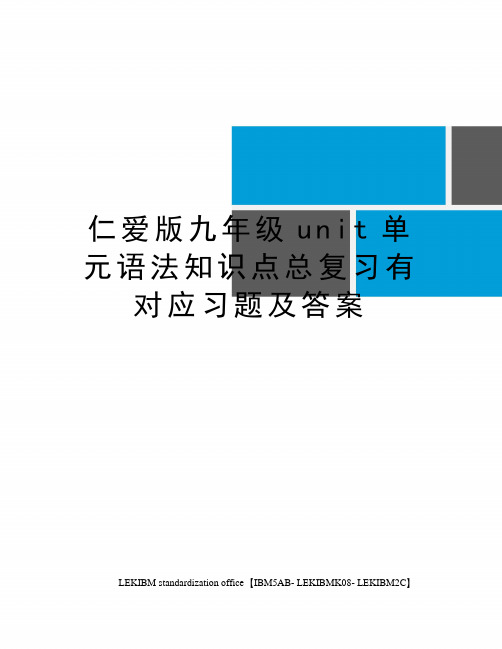
仁爱版九年级u n i t单元语法知识点总复习有对应习题及答案LEKIBM standardization office【IBM5AB- LEKIBMK08- LEKIBM2C】九年级英语Unit1单元归纳复习及相应课堂习题(含每个topic作文)1. Have/has been to, have/has gone to 和 have/has been in的区别主语+have/has been to + 地点“去过某地”(已返回)1 主语+have/has gone to +地点“去了某地”(未回来)主语+have/has been in +地点+for +段时间(待在某地,动作可以延长一定时间,后面常接段的时间)She has been in Japan for 2 year.She has been to Japan. She has gone to Japan.▲地点是名词须接to ,如果地点是副词则不接to。
Tom has been there.▲对地点提问用:where2.频度副词already,yet ,just,ever,never,在现在完成时中的作用3.4.(1)already 用在肯定句,用与句中,句尾均可,“已经”5.I’ve finished my homework already. I’ve already finished my homework .6.(2)yet 用于否定句或疑问句,“还”,用于句末。
在现在完成时的用法中,肯定句常用already,改用否定句和一般疑问句时常把already改为 yet(放句末)。
I have already found him.Have you found him yet(3)Just位于谓语动词前。
“刚刚”(也可以用于一般现在时,过去时态) He has just come back from France.(4) ever 多用与一般疑问句,否定句和条件状语从句中,“曾经”Have you ever been to France No, I haven’t. /Yes,I have.If you ever happen to come here ,be sure to visit us.(5)never 多用于否定的陈述句中,“从不……” (反义词是ever)I have never travelled on a plane.(变成一般疑问句)Have you ever travelled on a plane?He is never late for school. (它还可以用于其他时态中)(6)before 做副词时,”从前“,句中谓语常用现在完成时和过去时。
仁爱英语九年级UT知识点讲解及练习
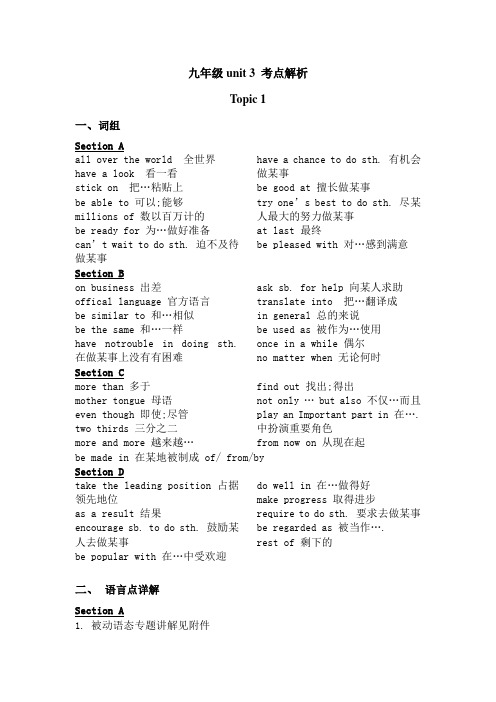
九年级unit 3 考点解析Topic 1一、词组Section Aall over the world 全世界have a look 看一看stick on 把…粘贴上be able to 可以;能够millions of 数以百万计的be ready for 为…做好准备can’t wait to do sth. 迫不及待做某事have a chance to do sth. 有机会做某事be good at 擅长做某事try one’s best to do sth. 尽某人最大的努力做某事at last 最终be pleased with 对…感到满意Section Bon business 出差offical language 官方语言be similar to 和…相似be the same 和…一样have notrouble in doing sth. 在做某事上没有有困难ask sb. for help 向某人求助translate into 把…翻译成in general 总的来说be used as 被作为…使用once in a while 偶尔no matter when 无论何时Section Cmore than 多于mother tongue 母语even though 即使;尽管two thirds 三分之二more and more 越来越…find out 找出;得出not only … but also 不仅…而且play an Important part in 在….中扮演重要角色from now on 从现在起be made in 在某地被制成 of/ from/by Section Dtake the leading position 占据领先地位as a result 结果encourage sb. to do sth. 鼓励某人去做某事be popular with 在…中受欢迎do well in 在…做得好make progress 取得进步require to do sth. 要求去做某事be regarded as 被当作….rest of 剩下的二、语言点详解Section A1. 被动语态专题讲解见附件2. You can stick it on the wall in your room.stick...on 把…粘贴到造句:Tom把他最喜欢的歌手的照片贴在书上..stick to doing sth. 坚持做某事 to+ Ving 的用法还有:get/be used to doing ; look forward to doing造句:她坚持每天说英语..3. be able to 可以;能够;相当于can.. be able to 有人称和时态的变化..4. I can’t wait to fly there.can’t wait to do sth. 迫不及待想做某事wait for 等待造句:当他在等公交车的时候;他的钱包被小偷偷了..5. Try your best and work much harder from now on.try/ do one’s best to do sth. 尽某人最大的努力去做某事补充:try to do./ try doing 的非谓语动词Section B1. I’m going to Cuba on business.on business 出差2. Is Spanish similar to Englishbe similar to 和…相似be the same 和…一样3. Is it possible for you to have any trouble.在做某事上有困难have trouble in doing sth. / have some difficulties in doing sth./have no trouble in doing sth 在做某事上没有困难形式主宾语语的句型: It is +adj. for sb. to do sth.主+think、suppose it +adj for sb. to do sth4. If necessary; I’ll ask an interpreter for help.If引导的条件状语从句 unless;as soon as向某人求助 ask sb. for help. / turn to sb.for help5. Besides; it is used as a second language in India and some other countries.besides 可做副词和介词..做介词时;译为“除了…之外还有…”注意与except的区别Besides English; students should learn many other sujects.except 译为“除了…之外”在范围外Everyone is here except Tom.besides作副词时;译为“而且;此外”I don’t want to Beijing. Besides; it’s too late now.6. Whenever that happens; an interpreter helps him.whenever 译为“无论何时” You can ask for help whenever you need. whatever “无论什么” whatever decision you made; I would support you.wherever “无论在哪里” Wherever he is; he will be happy.此外;还有whichever;however; whoever等;此时相当于no matter +疑问词Section C1. show sb. sthIt shows that…/ show sb. the way to2. even though/ if/although3municate with sb. by sth.Section D1. It is +adj + that 从句2. take the leading position3.be required as4. as well as “也”“既…又”用于连接名词;代词;或动名词They sell books as well as newspapers.as well as 还有“和…一样好“的意思He can dance as well as his wife.注意:as well 可以表示也的意思;放句末..四、巩固练习见附件:仁爱英语教材讲解。
仁爱版九年级上册unit topic 知识点
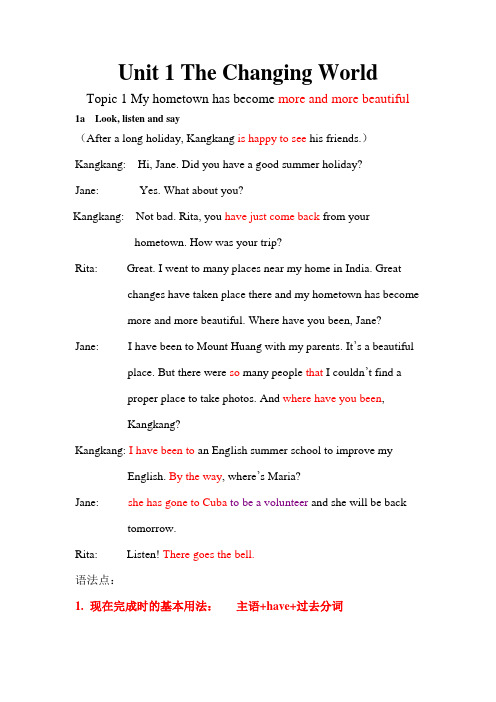
Unit 1 The Changing World Topic 1 My hometown has become more and more beautiful 1a Look, listen and say(After a long holiday, Kangkang is happy to see his friends.)Kangkang: Hi, Jane. Did you have a good summer holiday?Jane: Yes. What about you?Kangkang: Not bad. Rita, you have just come back from yourhometown. How was your trip?Rita: Great. I went to many places near my home in India. Great changes have taken place there and my hometown has becomemore and more beautiful. Where have you been, Jane? Jane: I have been to Mount Huang with my parents. It’s a beautiful place. But there were so many people that I couldn’t find aproper place to take photos. And where have you been,Kangkang?Kangkang: I have been to an English summer school to improve my English. By the way, where’s Maria?Jane: she has gone to Cuba to be a volunteer and she will be back tomorrow.Rita: Listen! There goes the bell.语法点:1.现在完成时的基本用法:主语+have+过去分词现在完成时跨在两个时间之上,一是过去,一是现在。
仁爱英语九年级unittopic知识点归纳

仁爱英语九年级u n i t t o p i c知识点归纳 Company number【1089WT-1898YT-1W8CB-9UUT-92108】G9 Unit 1 Topic 1Topic 1 Our country has developed rapidly.一、重点词汇(一)词形转换1. training -- train“训练”(v.)2. rapid (adj.)--- rapidly(adv.)3. recent (adj) -- recently(adv.)4. develop (v.) -- development (n.) -- developed“发达的”;developing“发展中的”(adj.)5. narrow (反义词) -- wide(二)重点短语★SA1. have a good summer holiday过一个愉快的暑假2. come back from…从……回来3. take place 发生4. have/ has been to... 去过……5. so... that... 如此……以至于6. improve my English 提高我的英语水平7. by the way 顺便问一问8. have/ has been to... 已经去了★SB1. take part in 参加2. volunteer activities 志愿者活动3. in a disabled children’s home在一家残疾儿童养育院4. feed sb. 喂某人5. a wonderful experience 一次精彩的经历6. learn…from 从……当中学习7. had (no) time to do sth. 有(没)时间做……8. put on funny shows for sb为某人表演有趣的节目9. a group of 一组,一群10. something meaningful 一些有意义的事情11. do some farm work 干一些农活★SC1. in the past 在过去2. at present 现在3. more than 超过,多于4. see …. oneself 亲眼看见……5. living conditions 生活条件6. ring roads 环形道路7. be crowed into 挤在……8. have the chance to do sth. 有机会做某事9. receive a good education 接受良好的教育10. keep in touch with sb by letter or telegram通过书信或电报与某人取得联系11. far away遥远12. the reform and opening-up 改革开放13. taller and brighter 又高又明亮14. satisfy one’s needs 满足某人的需要15. not only…but also…不但……而且……16. enjoy good medical care享受很好的医疗保健17. what’s more 而且18. make rapid progress取得很大/快速进步19. succeed in doing sth 成功地做某事20. remember the past 记住过去21. live in the present 立足现在22. dream about the future 展望未来23. the course of ……的过程★SD1. leisure activities 休闲活动2. play an important part in在……中发挥重要作用3. play hide-and-seek 捉迷藏4. play chess 下棋5. in one's spare/free time 在某人空闲时6. spend ... on sth. 花费……在……上7. various kinds of 各种各样8. both... and... 不仅……而且……9. places of interest 名胜古迹10. in the open air 在户外二、重点句型。
仁爱版九年级上册Unit 1 topic 3 知识点练习

Great,my company has ____me a good job.
A
A.offered B.provided C.introduced D.discovered
introduce介绍,discover发现,
第5页
*** offer 和 provide 都是提供的意思,区别 :
提供....---provide sb _____ sth=provide sth _____ sb
since
11、 短暂性动词不能和表示一段时间的时间状语连用,必须改用延续性动词
比如:离开:leave 改为 be away form
He has been _____ _____ the park since 8 o'clock.8点就离开公园了 away form
He has been _____ 时了。
[ˈmedɪkl] [ˈtriːtmənt] offer
3、 _____ with job training (职业培训) [prəˈvaɪd] 提供
provide
4、再次找到工作---------find jobs _____
again
12、 短暂性动词不能和表示一段时间的时间状语连用,必须改用延续性动词
1、漂亮的公园-------- _______ park
beautiful
2、洁净、清新的空气-------- _______ and _______ air
clean,fresh
3、大型购物中心--------big _______ center
shopping
4、大型市场------------ _______[hjuːdʒ] market
九年级仁爱英语Unittopic知识点讲解及课堂练习

Unit 1 The Changing WorldTopic 1 The Changing WorldSection A一、重点词汇1.be happy to do sth/be glad to do sth 很高兴做某事2.have a good summer holiday 过一个愉快的暑假e back from…从……回来4. great changes 巨大的变化4.take place/ happen 发生 been to…去过…summer school 英语暑期学校 photos 拍照the way 顺便问一下 has gone to…. 已经去….二.重点句子1. Great changes have taken place there and my hometown has become more and more beautiful2. But there were so many people that I couldn’t find a good place to take photos.3. I have been to an English summer school to improve my English.4. Listen There goes t the bell.have you been三.课本同步知识点讲解1. The Changing world 变化中的世界. Changing 是现在分词,做定语,修饰worldA sleeping boy 一个在睡觉的男孩has been to 与have/ has gone tohave/has been to+地点, 表示“去过”某地,强调“经历”.如:--- Where have you been I didn’t see you for a long time.你去哪了很长时间没见你了.--- I’ve been to Beijing. I’ve been there for a month. I came back yesterday.我去北京了,在那呆了一个月,昨天刚回来.have/has gone to +地点,表示“去了”某地,强调“不在这”.--- Where’s your father 你父亲去哪了--- He has gone to Beijing. He’ll come back in a week.他去北京了,一周后才回来.have/has been in +地点+for +时间段,表示“在某地呆了……的时间”.如:He has been in Beijing for ten years. 他在北京呆十年了.考题链接:(1)I________ never _________there before.A. have; beenB. have; goneC. have; been toD. have; gone to(2)My parents _____ Shandong for ten years.A. have been inB. have been toC. have gone toD. have been(3)—Where are Maria and Kangkang—They _____ England.A.have been to B.are away C.have gone to D.had been in3. But there were so many people that I couldn’t find a good place to take photos.so… that…如此…以至于,引导结果状语从句.So…that..引导的结果状语从句有时候而已 too..to…结构互换.He is so young that he can’t go to school= He is too young to go to school.注意: so that 还能引导目的状语从句“以便,目的在于”I’m going to take an early bus so that I’ll get there in time.我打算乘早班公共汽车,以便及时赶到那儿.so… that…与such… that…区别so + 形容词/副词 + that +句子.如:He is running so quickly that I can’t catch up with him.他跑得那么快,我赶不上他.The book was so interesting that I spent a whole day reading it.这本书太有趣了以至于我我看了一整天.so + many/much/little/few +名词 +that +句子.There were so many people that I couldn’t find a proper place to take photos.人是那么的多,以至于我找不到一个合适的地方照相.He drank so much wine that an accident happened to him on his way home.他喝了那么多的酒,以至于在回家的路上发生了事故.such +a/an +形容词 +单数名词 +that +句子.如:She is a lovely girl that all of us like her.她是如此可爱的一个女孩儿,我们大家都喜欢她.It was such a bad day that there was nobody on the street.天这么糟糕,街上空无一人.such +形容词+复数名词/不可数名词 +that +句子.They are such interesting movies that everyone wants to see them once again.它们是如此有趣的电影,大家都想再看一次.It was such bad weather that nobody was on the street.天这么糟糕,街上空无一人.so that +句子.表示“目的”或“结果”.如:He saved every coin so that he could buy a gift for his mother on Mother’s Day.为了能在母亲节给妈妈买个礼物,他积攒下每一块硬币.She bought a digital camera online so that she saved a lot of time.她在网上买了一部数码相机,这样她节约了很多时间.考题链接:(1)The camera is __________expensive__________ I can't afford it.A. so, thatB. such, thatC. so, as toD. enough, that(2)Miss Gao asked a question, but it was ________that nobody could answer it.A. very difficultB. too difficultC. difficult enoughD. so difficult(3)It was___difficult a question that___people could answer it.,few ,a few ,few ,a few(4)____ a fine day it is today-- Yes, the sunshine is _______ beautiful that I’d like to go swimming in the sea.( )A.How ,suchB. What a,veryC. How, soD. What a, so4.take place 与happen共同点:事物 + take place/happen, 没有被动语态.不同点:take place 指自然地、有计划地“发生”.如:A sports meet took place in our school last Monday.上周一我们学校举行了一场运动会.Great changes have taken place in my hometown.我的家乡发生了巨变.happen 指偶然的、意外地“发生”.如:A big earthquake happened in Wenchuan on May 12, 2008.2008年5月12日汶川发生了一场大地震.The accident happened at the corner of the street.那起儿事故发生在街道的拐角处.某人发生了什么事儿常用:事儿 + happen + to + 人.如:A car accident happened to him yesterday.他昨天发生了一场车祸.She hopes nothing bad will happen to her husband.她希望丈夫不会发生坏的事情.happen 表示“碰巧”的意思时,人可以做主语.如:I happened to meet him on the street.我碰巧再街上遇见他.I happened to be there when the fire happened.It happened that I was there when the fire happened.火灾发生时我碰巧在那儿.“提高,(使)好转,改进,改善”.①可作及物动词. Improve oneself 自我提高.He has improved his health. 他的健康状况得到了改善②可作不及物动词His health is improving. 他的健康状况正在好转.Improve on/upon …对..做出改进.He has improved on the invention. 他进一步完善了他的发明.5. There goes the bell= That is the bell= The bell is ringing. 铃响了.此句为副词there 提前,句子要用倒装语序. 当主语是代词时用局部倒装,主语是名词时则用完全倒装..这是一个“倒装句”.正常语序是:The bell goes there.类似的还有:Here come the models. 模特们走来了.Here comes the bus. 车来了.当主语是代词时,常用“半倒装”.如:Here we are. 我们到了.Here you are. 给你.Here it is. 给你./它在这儿.Here you are. 给你考题链接:.—— Here ____ Where is Xiao LiuThere ____.A. comes the bus, is heB. comes the bus, he isC. the bus comes, is heD. the bus comes, he isSection B一.重点词汇1. for a long time 很久2. take part in/ join in ….参加..activities 志愿者活动 the summer holidays 在暑假期间a disabled children’s home 在残疾儿童之家…from…. 从…中学习到…. 7. make sb happy 让某人开心.other place/ other places别的什么地9. have (no) time to do sth 有(没)时间做某事10. put on funny shows 表演有趣的节目 11. a group of…一群….(no)time to do sth 有(没有)时间做某事二.重点句子1. You took part in some volunteer activities during summer holidays, didn’t you2. What a wonderful experiencethink it makes me happy to help others.you been to any other placeI had no time to travel, I still felt very happy.help others makes us happy.三.知识点讲解haven’t seen you for a long time. 好久没见到你了.现在完成时态的否定结构是 haven’t/hasn’t + 过去分词.现在完成时态与For+一段时间连用, 谓语动词只能用延续性动词.考题链接:—When _____ you _____ this book—I ____ it for two weeks.A. have; bought; have hadB. did; buy; have hadC. have; bought; boughtD. did; buy; have bought2.learn...from... 从..中学习(到)....He learnt a lot from his friend last summer.Learn to do sth 学会做某事Section C一.重点词汇二. sb 面试/采访某人 2. More than 超过、多余 3. See...oneself 亲眼目睹4.in the 1960s 在20世纪60年代 living conditions 生活条件6.be crowded into 挤进.. the chance to do sth 有机会做某事8.receive a good education 接受良好的教育 9. See a doctor 看医生10.keep in touch with.. 与..保持联系 away 遥远 ...通过/靠...12.reform and opening-up 改革开放 the internet 在网上14.what’s more 另外,而且 15. Make rapid progress 取得迅速进步16. Succeed in doing sth 成功的做了某事二.重点句子1.She has lived in Beijing for more than forty years.2.She has seen the changes in Beijing herself.3.In the 1960s, the living condition in the city were poor.4.Few children had the chance to receive a good education.5.People kept in touch with their friends and relatives far away mainly by letter or telegram.6.China has developed rapidly since the reform and opening-up.7.Beijing has made rapid progress and it has already succeed in hosting the 2008 Olympic Games.8.I think it is important to remember the past, live in the present and dream about the future.三.知识点讲解1.more than 相当于 over,意为“超过,多余”,后长跟数次more than/over ten men 十多个人. More..than....比..更多I have more friends than you.2.在表示“某个世纪某个年代”时,后面要加s,在表示具体的某一年时,则不需要加s.如:in the 1940s 二十世纪四十年代,是指在1940-1949年期间的某一年;而in 1940 则指在 1940年the chance to do sth. 有机会做某事, have no chance to do sth 没有机会做某事I’ll have the chance to visit your factory next Sunday.4. far away 遥远,为副词短语,常放在句末作后置定语.They live in a village far away.Faraway 为adj, 遥远的. A faraway townfar away from+地点, 距某地遥远. 如果前面有用具体数字时,则不能用farMy home is far away from Beijing.My hometown is about 100 kilometers away from Shanghai.我的家乡离上海大约1000千米.v.发展,发达. Developed 发达的. Developing adj.发展中的.Development n.发展6. Satisfy v.使(某人)满意或满足.It’s impossible to satisfy everyone.Be satisfied with.... 对...感到满意、满足,同义词组为be pleased with...He is satisfied with his new job.= He is pleased with his new job.7.not only...but also...不但...而且...,用来连接2个相同的成分.连接主语时,谓语动词的数须和邻近的主语保持一致.(就近原则)Not only he but also I have been to Canada.考题链接:Not only my father but also my grandpa _______ flying to Singapore this weekend. A. is B. are C. wasTo tell the truth, not only you but also she ______ given away all the pocket money to Project Hope.A.haveB. hasC. areD. Is8.Make rapid progress 取得Progress 为不可数名词.(n) 成功 ----succeed(v)---successful(adj)Succeed in doing sth = be successful in doing sth. 成功的做了某事.think it is important to remember the past, live in the present and dream about the future. It 在句中作为从句中的形式主语,真正主语为动词不定式.结构为 it is+ adj+(for sb)+ to do sth.It is very good for you to do morning exercises. 对你来说做早操是非常好的.注意和 It is + adj+(of sb) to do sth. It 在这里也是作为形式主语,真正主语为不定式.区别:在使用时要注意adj是说明sb的品质特点的还是说明to do sth的就可以了.说明sb的品质特点用of sb;说明to do sth用for sb.,简单一句话说就是:说人的用of sb. 说事的用for sb.考题链接:( ) 1. We think it is difficult _______ them ________ the charity walk without team spirit. (2010南通)A. for; to finishB. of; to finishC. for; finishingD. of; finishing 完成下列句子,试试:1. It was stupid ____ me to talk in that way to my mother.2. It is very important ___ us to master English.3. It was impossible ____the little boy to carry such a heavy box.4. It is smart ___ them to make good use of the Internet.about.. 梦想、展望、梦见后接名词或动词-ing 形式.He dreams about a new house.He used to dream about living abroad.I sometimes dream about my parents.Dream of 渴望、向往、考虑I dream of becoming a teacher.我一心想当个教师.Section D一.重要词汇1.leisure activities 休闲活动2. The kinds of 各种各样的..3. Relax oneself 放松自己4.play an important part in.. 发挥重要作用.5. Watch opera 看戏6.in one’s spare time 在某人空余时间7.Spend some time/money on sth/(in ) doing sth 花时间、金钱做某事8. Various kinds of..各种各样的. 9. Both..and.. 不仅..而且.., ... 和...都...9. at home.呆在家 10 have a rest 休息 11. Chat on the internet 网上聊天12.In recent years 在最近几年 13. Make a tour abroad 出国旅游14. In the open air 在户外、露天 15. Go roller skating 滑旱冰二.重要句子1.Leisure activities play an important part in people’s lives.2.Few people had chance to travel.3.Watching operas and listening to the radio were the main activities in their spare time.4. A lot of people love both to play and to watch team sports like basketball or football.三.知识点1.Kind(n) 种、类. A kind of..一种, all kinds of..各种各样的.The kinds of...(特指)各种各样的...2.play a part/role in sth 发挥重要作用/扮演重要角色The internet plays an important part/role in our lives.3.spend(v) 花费.. 常用词组 spend.. on sth/ spend... (in) doing sth.考题链接:—Do you always spend lots of time ________playing computer games—No, but I spend much time_______my homework.A. on; inB. on; onC. in; onD. in; in4.both..and... 不仅..而且..., ...和.....都.... 与.. Not only..but also..同义The food in this restaurant is both delicious and cheap.=The food in this restaurant is not only delicious but also cheap.注意: both..and...连接2个主语时谓语动词用复数;not only...but also..用就近原则Both English and maths are my favorite subjects.=Not only English but also maths is my favorite subject.考题链接:_____ are League members. [ ]A. Both you and meB. Both you and IC. Both he and her重点语法(一)现在完成时:表示过去已经发生或已经完成的某一动作对现在造成的影响或结果.即“过去的动作 + 现在的结果”, 强调结果.构成形式:现在完成时由“主语+助动词have / has + 动词的过去分词”构成,他的否定句是在have/has的后面加上not, 一般疑问句是将have/ has 和主语交换位置.1.肯定句: I have seen the film. 我已经看过这部电影.否定句: I haven’t seen the film. 我没看过这部电影.一般疑问句:Have you seen the film 你看过这部电影了吗回答: Yes, I have.是的,我看过了. No, I haven’t.不,我没看过.特殊疑问句: What have you done 你已经做了什么考题链接:1. Miss Lin_______ a lot of work for the poor area since 2010.A. doesB. didC. has doneD. will do2. The old man has______ the changes in China_________.A. saw; himB. see; himselfC. seen; himselfD. seen; himyou_______ your homework yet ------Yes, I ______ it.A. Did do finishedB. Have done finishedC. have done have finishedD. will do finish you_____ your homework yet ----- Yes, I____ it a moment ago.A. Did; do; finishedB. Have; done; finishedC. Have; done; have finishedD. Will; do; finish句型转换1. He has already gone home.He_______ _______ home _________.(否定句)____________ he___________ home________ (一般疑问句)2.He has lunch at home.He________ _________ lunch at home. (否定句)___________ he ________lunch at home.3.He has been there twice.___________ __________ __________ _______ he been there (划线部分提问)4. I have lunch at school._________ ________ you _______lunch.。
仁爱英语九年级上册UnitTopic知识点
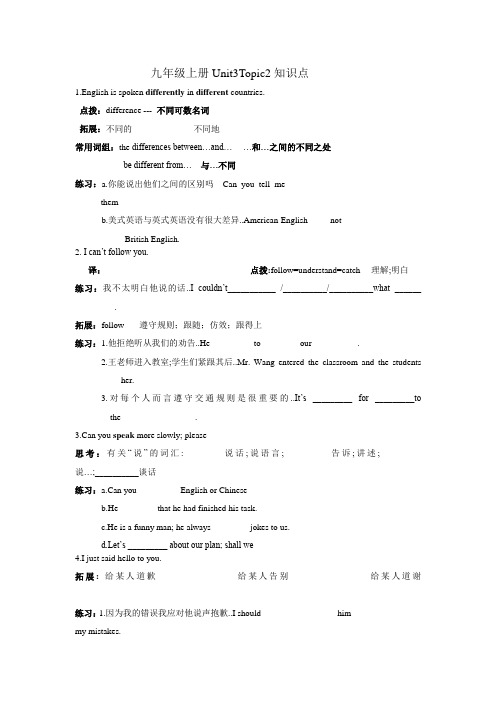
九年级上册Unit3Topic2知识点1.English is spoken differently in different countries.点拨:difference ---不同可数名词拓展:不同的_____________ 不同地______________常用词组:the differences between…and… ---…和…之间的不同之处be different from…---与…不同练习:a.你能说出他们之间的区别吗Can you tell me _______ ____________ _________ themb.美式英语与英式英语没有很大差异..American English ____ not _______ _______________ British English.2. I can’t follow you.译:_______________________________ 点拨:follow=understand=catch ---理解;明白练习:我不太明白他说的话..I couldn’t___________ /__________/__________what ______ _________.拓展:follow --- 遵守规则;跟随;仿效;跟得上练习:1.他拒绝听从我们的劝告..He _________ to ________ our __________.2.王老师进入教室;学生们紧跟其后..Mr. Wang entered the classroom and the students __________ her.3.对每个人而言遵守交通规则是很重要的..It’s _________ for _________to ________the ________ ________.3.Can you speak more slowly; please思考:有关“说”的词汇:_________说话;说语言; _________告诉;讲述; ________说…;__________谈话练习:a.Can you _________ English or Chineseb.He ________ that he had finished his task.c.He is a funny man; he always ________ jokes to us.d.Let’s _________ about our plan; shall we4.I just said hello to you.拓展: 给某人道歉__________________给某人告别__________________给某人道谢_____________________练习:1.因为我的错误我应对他说声抱歉..I should _____ _______ ____him __________ _____ my mistakes.2.天黑了;我们该互相道声再见了..It’s ________ now; we’d ________ _______________ to ______ ______.3.帮了我们这么大的忙;请让我们对你说声感谢..Let’s ______ _______ ____ you foryou ______ us so much.5.Not exactly.exact adj. 精确的exactly adv. 精确地not exactly the same不完全一样6.call instead of the same as for example English-speaking countriesspoken /oral English once tell sb.notto do sth.7.Once; when I was in London; my friends told me to put my suitcase in the boot.boot---长筒靴; 行李箱英点拨:once --- 过去曾经;有一次副词链接:once ---一旦once ---一次副词练习:写出once 的意思:a.Once you start; you will never give up.b.Once he lived in America; but now he lives in England.c.We ought to see the dentist once a month.8.Sounds interesting.9.By the way; I’m flying to Disneyland tomorrow.be flying 现在进行时态表将来多位于位移动词:leave; come; go; arrive; start; move; travel等..eg: 他们下周将要去日本..They are leaving for Japan next week.1.你什么时候动身When _______ you _________2.我要走了..I ______ _________.3.王叔叔要来吃晚饭..Uncle Wang _____ _________ to have supper.4.妈妈今天下午去香港..My mother _____ _________ for Hong Kong this afternoon.5.我明天飞罗马..I ______ _________ to Rome tomorrow.拓展:某些非位移动词亦可用现在进行时表将来:sleep; take; change; work; see; buy; meet等..10.Enjoy youself11.each other all the time depend on12.There are differenecs between British Engish and Ameican English.13.Australian Engish is a little different from British English .14.If you want to make yourself understood; you need to know somen of these differences.点拨:make oneself + 过去分词--- 使某人或某物被…She couldn’t make herself heard because of the noise.My English is so poor. I can’链接:a.make sb. do sth.---让使某人做某事 b.make sb./sth.+形容词---使某人/某物成…状态c.make sb.+名词---选某人为…练习:a.She _______ makeher children ________ wash their hands before ________ eat.b.The teacher ________make him ________stay after school yesterday.c.切洋葱让我流泪..________ the onions _______ ____ _______.d.我们选他做班长..We _____ ____ monitor.e.烧菜的味道令我感到肚子饿..The smell of cooking ________ _____ _________.need 实义动词need to do sth. We need to study hard.need doing sth.=need to be doneeg:这个房间需要打扫..The room needs cleaning.=The room needs to be cleaned.情态动词need not do sth动词原形;多用于疑问句和否定句There is enough time; you needn’t hurry.Must I hand in the homework now------Yes; you must./No; you needn’t.Need I do it now-----No; you needn’t./ Yes; you must.1.see....off如果明天天好;我将去给她送行..If it ____ fine tomorrow; I ____ ________ ____ ______.2.on the way to +地点回家的路上去学校的路上on the way home on the way to school练习:a.在我回家的路上我看到一辆小型巴士..____ _____ _____ _______; I saw a ___________.b.她在赴机场的途中;车子发生了故障..She was ____ ____ _____ ____ the airport whenher car broke down.链接:No way---_________by the way___________This way; please____________3.. .Michael sees a foreigner putting out his hand with his thumb raised.总结:1 _________________---看见某人在做某事; _________________---看见某人做了某事全过程类似的感官动词还有: _________听见;__________观看;___________注意到;___________发现等练习: a. I saw them _____________play volleyball all this time yesterday.b.When I came in; I noticed him _____________watch TV.c.He found a boy _____________break the glass of the window and run away.点拨: put out --- 伸出; 熄灭练习: a.吉姆把脚伸出来把我绊倒了..Jim _______ his foot _______ and tripped me.b.The firefighters did what they could to put out the fire.点拨:with his thumb raised ---大拇指朝上介词短语做伴随状语;其中raised是过去分词作histhumb的后置定语4.What’s up5. ask for a ride give sb. a ride reach=arrive in/at =get to be worried about6.I hope I won’t have much difficulty communicating.7. in twenty minutes kidin twenty minutes 译:____________________ 点拨:in在…以后;后加时间段;常与将来时连用练习:a.只需要一周的时间就会准备好.. It will be ready _____ ______ ______ time.b.---会议多久以后开始---一个半小时后..---______ ______ _____ the meeting begin ---It will begin ____ ____ ______ ___ ______ _______.8.Generally speaking; American English is different from British English in pronunciation and spelling.点拨:generally speaking ---一般来说;大体上;大概放于句首;用于总体说明一件事; 相当于in general练习:a.一般来说;你现在准备得越充分;考试前你越不会紧张..__________ __________; ____ ______ preparation you do now; ____ _____nervous you will bebefore the exam.ed to do sth.过去常常做某事be/ get used to doing sth.习惯于做某事be used to do sth被用于做某事1. 我过去常常在早上喝咖啡..I used to drink coffee in the morning.2. 我习惯于在早上喝咖啡..I am/ get used to drinking coffee in the morning.3. 木材能被用于制作各种家具..The wood can be used to make many kinds of furniture.10.As for the spelling differences; you can easily find them when you use a computer.点拨:as for sb./sth. ---至于;关于某人或某物..练习:a.至于莉莉;她现在日子过得不错.. _____ _____ Lily; she is doing fine.b.关于那道数学难题;我已经解决了..____ _____ that math problem; I ________ ________ it _______.11.However; most of the time; people from the two countries do not have much difficulty understanding each other.点拨:difficulty---艰难;费劲;辛苦;难度;困难不可数名词have difficulty in doing sth.---干某事The Disneyland in California is close to Los Angeles.点拨:be close to 是一个形容词性短语;意为“紧挨着……” ..此时close意为进的;与……靠近距离或空间练习:宾馆就在城中心附近..The hotel ____ ________ ____ the _________ ____ the town.拓展:close --- 亲密的;亲近的形容词; close --- 关闭动词练习:a.我和我哥关系十分密切..My brother and I ________ very ________.b.我和杰克自六岁时就是密友..Jack and I have been ________ ________ ________ we ________ six.12.They are fond of exciting rides like Pirates of the Caribbean.点拨:be fond of… --- 喜欢练习:a.他非常喜欢踢足球..He ____ ______ ____ _________ ___________.b.她过去喜欢弹钢琴..She _______ ____ be _______ _____ _______ the piano.13e about in the beginning in a different way little by little 逐渐地14.Long ago; many British people were forced to leave their country and go to some other places.点拨:1force --- 强迫;迫使动词用法:force sb.to do sth.强迫某人做某事2be forced to do sth.---被迫做某事..练习:因为没有赶上末班车;我被迫打的..I _____ ________ ___ take a taxi because I couldn’t__________ the last bus.15.The English language has also taken in many new worlds from other languages.点拨:take in ---吸收;接纳;收留练习:最后;我们决定接纳他..____ ______; we _________ to _______ _____ ____.总结:take短语小结take away拿走take the place发生take it easy不着急; 从容take off脱掉;摘去衣物;起飞take out 取出take the place of 取代… take care=be careful小心take part in=join in; 参加活动take photos 拍照take measures 采取措施take care of= look after=care for照顾take up占据时间;地位一.翻译下列短语1 众所周知2总是;一直3取决于;依靠;依赖4成功做某事5面对面6表达自己意思使自己被人明白1给…送行2在去…的路上3伸出;扑灭4什么事5搭便车6搭载;捡起7进入;收获8对….感到担心9做某事有很大困难10动身去某地1在…和…之间2通常来讲;一般来说3与…不同4习惯于5对于;至于6填充7.靠近;接近8喜欢;喜爱9不但…而且…1发生 2.很久以前3.被迫做某事4.用一种不同的方式5.逐渐地;慢慢地6从…吸收7. 总之;简而言之8 起初;一开始二、根据句意及首字母提示补全单词..1.If you want to learn English well; you should pay attention to its spelling andp_____ .2.What are the d_____ between the two pictures3.Fall is another saying of a _____ .4.People in the city held a great party to celebrate their v_____ .5.He spoke English with a little Dutch荷兰语的a_____ .三、根据句意;用所给单词的适当形式填空..1. We should know the _________ different between British English and American English.2. The woman is too nervous to make her ___________ understand.3. My teacher ________ fly to Fujian next week.4. He succeeds in _______ pass the exam.5.She ________ force herself to be polite to them.6.The two ________German are from Germany.7.English is spoken ________different in different English-speaking countries.8.In the word “knew”; the letter“k”is not ________pronounce.9.In ________ Australian; people call their friends “mates”.四.英汉互译..1.我父亲叫我把旅行箱放在汽车尾部的行李箱里..My father _____ me _____ put the suitcase in the boot.2.澳大利亚英语和英式英语一样吗Is Australian English _____ _____ _____ British English3.迈克尔将去机场为王军峰送行..Michael is going to the airport _____ _____ Wang Junfeng _____.4.昨天下午4:00林涛看到他的同学在操场上打篮球..Lin Tao _____ his classmates _____ basketball on the playground at 4:00 p.m. yesterday.5.陈真学英语没有困难..Chen Zhen has no _____ in _____ English.。
仁爱版九年级英语上册unittopic精选知识点练习
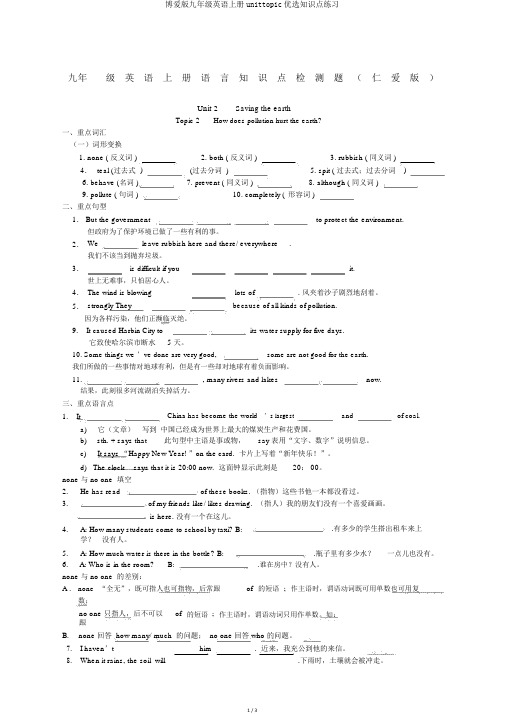
九 年 级 英 语 上 册 语 言 知 识 点 检 测 题 ( 仁 爱 版 )Unit 2Saving the earthTopic 2How does pollution hurt the earth?一、重点词汇 (一)词形变换1. none ( 反义词 ) 4. teal (过去式 6. behave (名词 ) 9. pollute ( 句词 )) 2. both ( 反义词 ) (过去分词 )7. prevent ( 同义词 )10. completely (3. rubbish ( 同义词 ) 5. spit ( 过去式;过去分词 8. although ( 同义词 )形容词 )) 二、重点句型1. But the governmentto protect the environment.但政府为了保护环境已做了一些有利的事。
2. Weleave rubbish here and there/ everywhere.我们不该当到抛弃垃圾。
3.is difficult if youit.世上无难事,只怕居心人。
4. 5.The wind is blowing strongly Theylots of . 风夹着沙子剧烈地刮着。
because of all kinds of pollution.因为各样污染,他们正濒临灭绝。
9. It caused Harbin City toits water supply for five days.它致使哈尔滨市断水5 天。
10. Some things we ’ve done are very good,some are not good for the earth.我们所做的一些事情对地球有利,但是有一些却对地球有着负面影响。
11., many rivers and lakesnow.结果,此刻很多河流湖泊失掉活力。
三、重点语言点 1. ItChina has become the world’s largestandof coal.a) 它(文章) 写到 中国已经成为世界上最大的煤炭生产和花费国。
仁爱英语九年级上册Unit-1-Topic2重点笔记与知识点整合复习+综合训练题
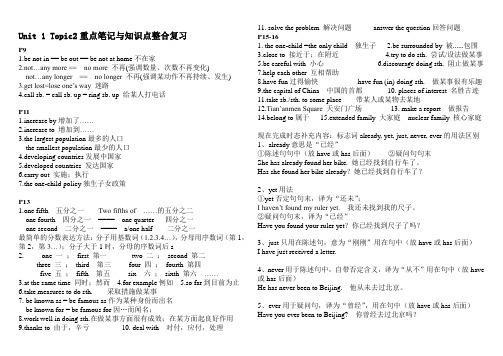
Unit 1 Topic2重点笔记与知识点整合复习P91.be not in == be out == be not at home不在家2.not…any more == no more 不再(强调数量、次数不再变化)not…any longer == no longer 不再(强调某动作不再持续、发生)3.get lost=lose one’s way 迷路4.call sb. = call sb. up = ring sb. up 给某人打电话P111.increase by增加了……2.increase to 增加到……3.the largest population最多的人口the smallest population最少的人口4.developing countries发展中国家5.developed countries 发达国家6.carry out 实施;执行7.the one-child policy独生子女政策P131.one fifth 五分之一Two fifths of ……的五分之二one fourth 四分之一==== one quarter 四分之一one second 二分之一==== a/one half 二分之一最简单的分数表达方法:分子用基数词(1.2.3.4…),分母用序数词(第1,第2,第3…);分子大于1时,分母的序数词后s2. one 一;first 第一two 二;second 第二three 三;third 第三four 四;fourth 第四five 五;fifth 第五six 六;sixth 第六……3.at the same time 同时;然而4.for example例如5.so far到目前为止6.take measures to do sth. 采取措施做某事7. be known as = be famous as作为某种身份而出名be known for = be famous for因…而闻名;8.work well in doing sth.在做某事方面很有成效;在某方面起良好作用9.thanks to 由于,辛亏10. deal with 对付,应付,处理11. solve the problem 解决问题answer the question回答问题P15-161. the one-child =the only child 独生子2.be surrounded by 被......包围3.close to 接近于;在附近4.try to do sth. 尝试/设法做某事5.be careful with 小心6.discourage doing sth. 阻止做某事7.help each other 互相帮助8.have fun过得愉快have fun (in) doing sth. 做某事很有乐趣9.the capital of China 中国的首都10. places of interest 名胜古迹11.take sb./sth. to some place 带某人或某物去某地12.Tian’anmen Square 天安门广场13. make a report 做报告14.belong to属于15.extended family 大家庭nuclear family 核心家庭现在完成时态补充内容:标志词already, yet, just, never, ever的用法区别1、already意思是“已经”①陈述句句中(放have或has后面)②疑问句句末She has already found her bike. 她已经找到自行车了。
仁爱版英语九年级上册Unti1---Unit2 考点复习总结

仁爱版英语九年级上册考点(unit 1-unit 2)【教材回归 考点过关】1.have/has been to 表“曾经去过某地”(去而复返)区别:have/has gone to 表“已经去某地了”如: I have been to Shanghai.(去过上海,已经回来)He has gone to Shanghai.(去上海了,不在此处)2.have (no) time to do sth 做某事(没)有时间Tom is busy helping his mother with housework, he has no time to play with you. 汤姆忙于帮助妈妈做家务,他没有时间和你玩3.What’s the population of...? 对人口提问=How large is the population of ...What’s the population of China? 中国的人口是多少?How large is the population of China?注:人口不能用many/much 修饰,但是how many people 对多少人提问这样是可以的。
How many people are there in China?=What’s the population of China? 4.What do you mean by sth.?某物是什么意思呢?= What’s the meaning of sth.? = What does sth.mean?如:What do you mean by the word? 这个单词是什么意思?= What’s the meaning of the word?= What does the word mean?5.----How long have you been like this? 你处于这样的状态多久了?---- I have been like this since last month.自从上个月以来我一直这样。
- 1、下载文档前请自行甄别文档内容的完整性,平台不提供额外的编辑、内容补充、找答案等附加服务。
- 2、"仅部分预览"的文档,不可在线预览部分如存在完整性等问题,可反馈申请退款(可完整预览的文档不适用该条件!)。
- 3、如文档侵犯您的权益,请联系客服反馈,我们会尽快为您处理(人工客服工作时间:9:00-18:30)。
仁爱英语九年级U T知识点讲解及练习
集团文件发布号:(9816-UATWW-MWUB-WUNN-INNUL-DQQTY-
九年级unit 3 考点解析
Topic 1
一、词组
Section A
all over the world 全世界have a look 看一看
stick on 把…粘贴上
be able to 可以,能够
millions of 数以百万计的
be ready for 为…做好准备can’t wait to do sth. 迫不及待做某事have a chance to do sth. 有机会做某事
be good at 擅长做某事
try one’s best to do sth. 尽某人最大的努力做某事
at last 最终
be pleased with 对…感到满意
Section B
on business 出差
offical language 官方语言
be similar to 和…相似
be the same 和…一样
have (no)trouble in doing sth. 在做某事上(没有)有困难ask sb. for help 向某人求助translate into 把…翻译成in general 总的来说
be used as 被作为…使用once in a while 偶尔
no matter when 无论何时
Section C
more than 多于
mother tongue 母语even though 即使,尽管two thirds 三分之二more and more 越来越…find out 找出,得出not only … but also 不仅…而
且
play an Important part in 在….中扮演重要角色
from now on 从现在起
be made in 在某地被制成(of/ from/by)Section D
take the leading position 占据领先地位
as a result 结果
encourage sb. to do sth. 鼓励某人去做某事
be popular with 在…中受欢迎do well in 在…做得好
make progress 取得进步require to do sth. 要求去做某事
be regarded as 被当作….
rest of 剩下的
二、语言点详解Section A
1. 被动语态专题讲解(见附件)
2. You can stick it on the wall in your room.
stick...on 把…粘贴到
造句:Tom把他最喜欢的歌手的照片贴在书上。
stick to doing sth. 坚持做某事(to+ Ving 的用法还有:get/be used to doing , look forward to doing )
造句:她坚持每天说英语。
3. be able to 可以,能够,相当于can。
be able to 有人称和时态的变化。
4. I can’t wait to fly there.
can’t wait to do sth. 迫不及待想做某事
wait for 等待造句:当他在等公交车的时候,他的钱包被小偷偷了。
5. Try your best and work much harder from now on.
try/ do one’s best to do sth. 尽某人最大的努力去做某事
(补充:try to do./ try doing 的非谓语动词)
Section B
1. I’m going to Cuba on business.
on business 出差
2. Is Spanish similar to English
be similar to 和…相似(be the same 和…一样)
3. Is it possible for you to have any trouble.
在做某事上有困难 have trouble (in) doing sth. / have some difficulties in doing sth./
have no trouble in doing sth 在做某事上没有困难
形式主(宾语)语的句型: It is +adj. for sb. to do sth.
主+think、suppose it +adj (for sb.) to do sth
4. If necessary, I’ll ask an interpreter for help.
If引导的条件状语从句(unless,as soon as)
向某人求助 ask sb. for help. / turn to sb.(for help)
5. Besides, it is used as a second language in India and some other countries.
besides 可做副词和介词。
做介词时,译为“除了…之外还有…” (注意与except的区别) Besides English, students should learn many other sujects. except 译为“除了…之外”在范围外
Everyone is here except Tom.
besides作副词时,译为“而且,此外”
I don’t want to Beijing. Besides, it’s too late now.
6. Whenever that happens, an interpreter helps him.
whenever 译为“无论何时” You can ask for help whenever you need.
whatever “无论什么” whatever decision you made, I would support you.
wherever “无论在哪里” Wherever he is, he will be happy.
此外,还有whichever,however, whoever等,此时相当于no matter +疑问词
Section C
1. show sb. sth
It shows that…/ show sb. the way to
2. even though/ if/although
municate with sb. by sth.
Section D
1. It is +adj + that 从句
2. take the leading position
3.be required as
4. as well as “也”“既…又”用于连接名词,代词,或动名词They sell books as well as newspapers.
as well as 还有“和…一样好“的意思
He can dance as well as his wife.
(注意:as well 可以表示也的意思,放句末。
)
四、巩固练习
(见附件:仁爱英语教材讲解)。
